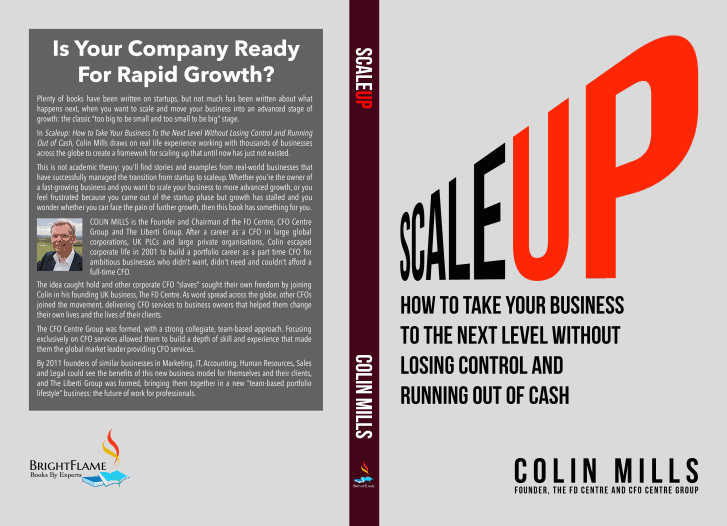
Rapid growth is the stuff most entrepreneurs dream about as they take their fledgeling company through the early years but when it happens, it can quickly become the stuff of nightmares.
The bubbles in the celebratory champagne—“Here’s to our success!”—barely have time to go flat before the problems arise across the high-impact growth or Scale-Up business.
Suddenly owners are beset by problems involving the people they’ve hired or not hired, their cashflow chokes, and processes that once worked so smoothly groan to a halt. Customers then leave snide reviews because products or services aren’t delivered on time, and key suppliers get angry at delayed payments. Bankers who were once so keen on business begin to crank up the pressure as overdrafts or loans get close to the ‘red zone.
No wonder then that so many business owners spend hours every night staring into the darkness wondering what on earth happened to their once easy-to-manage business.
The owners of high impact growth or Scaled Up businesses are often the loneliest, most isolated and overworked individuals. While start-up owners get an avalanche of government help and assistance, their Scaled Up counterparts get very little attention or assistance.
The FD Centre’s Chairman Colin Mills says he’s seen first-hand what pressure does to business owners.
“I’ve sat in sales meetings with entrepreneurs who had literally been brought to tears by stress and frustration and the feeling that it’s all too much.”
It’s for this reason that Colin has written Scale Up: How to Take Your Business to the Next Level Without Losing Control and Running Out of Cash.
It’s aimed at the owners of companies facing or already experiencing the problems of scaling their businesses to ensure they minimise the problems and achieve growth in a controlled, sustained way.
“Our experience suggests that scaleup issues start to bite at about £1M/$1M Sales Revenue or a minimum of 10 employees,” he explains.
“By the time a business reaches £50M/$50M Sales Revenue or 250 employees (larger firms tend to have fewer employees per £/$ of Sales Revenue) they can most often be considered a “scaler”: they are past the main dangers of scaleup.”
In his book, Colin explains why scaling a business can be so problematic. The business owner has to deal with one or even all of the following:
- People challenges
- Sales and marketing challenges
- Operational challenges
- Administrative challenges
- Financial challenges
Colin explains, “Businesses run the gauntlet of increasingly severe challenges, mostly because they are growing but don’t have the necessary infrastructure to support their expanded operations.
“While on paper, they may have the revenue, the manufacturing base or customer reach of a substantial business, the culture, the controls, the processes, the personnel and the leadership remain those of a much smaller business than they were a short time before.
“Worse, they haven’t yet accumulated the resources to build and maintain that infrastructure.”
This creates a hazardous situation for the business, he says.
“The biggest danger in this period is that the business will either outrun itself or get stuck, like a deer in headlights. Outrun, as the company spirals out of control and its cash reserves dwindle trying to meet the expanded demands of the business.
“Or stuck, as the entrepreneur tries to cope with everything at once, frustrated that the problems he could happily once deal with—back when the business was smaller—are not being dealt with by the people he is employing, often at substantial cost.”
Overcoming such problems or avoiding them is only possible if you revise your business model.
“You need to consider your whole business model, because if you have a terrible business model, then the last thing you want to do is to start scaling it. If you do that, then all the small problems that make your life a nightmare now will become major headaches.
“If your business model isn’t great, however, it doesn’t mean that all is lost: there’s a lot you can do to retrofit, design and redesign a business.”
Besides explaining the challenges scaling businesses face, Colin also provides the methods you need to use to overcome them—the same methods that the FDs from the FD Centre offers their clients.
They’re also the methods the FD Centre has used in its own scaling-up process, says Colin.
The FD Centre is a scaleup that has been growing at over 30% for the last three years with close to 400 FDs but Colin admits he keeps a keen focus on the business, the business model and the key performance indicators.
“It might be a scaleup now, but that doesn’t mean to say it’s not going to career out of control. I have to keep my eyes on the business, re-evaluate the business model, watch the indicators.”
Along with practical advice that you can use immediately, the book features an array of case studies in which business owners describe how they overcame the challenges of scaling their businesses.
So, if your business is on the verge of or already experiencing the ‘difficult teenage’ phase and you’re wondering how to overcome the nightmare challenges you’re facing, this book is for you.
It’s available on Amazon as a paperback and Kindle ebook here.
And to discover how the FD Centre will help your company to scale up, please call us on 0800 169 1499 or contact us here.
Schakel een parttime CFO in
Vertel ons wat u echt wilt voor uw onderneming en leven en laten we het plan bespreken om het echt te realiseren
